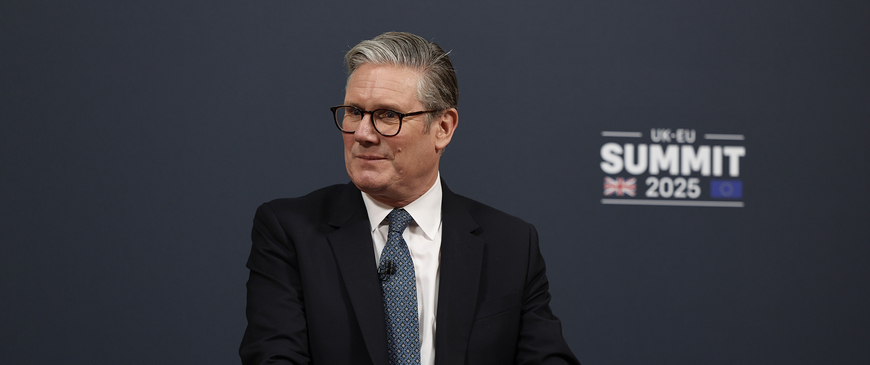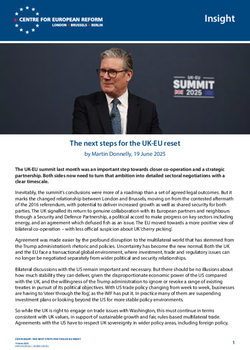
The next steps for the UK-EU reset
The UK-EU summit last month was an important step towards closer co-operation and a strategic partnership. Both sides now need to turn that ambition into detailed sectoral negotiations with a clear timescale.
Inevitably, the summit’s conclusions were more of a roadmap than a set of agreed legal outcomes. But it marks the changed relationship between London and Brussels, moving on from the contested aftermath of the 2016 referendum, with potential to deliver increased growth as well as shared security for both parties. The UK signalled its return to genuine collaboration with its European partners and neighbours through a Security and Defence Partnership, a political accord to make progress on key sectors including energy, and an agreement which defused fish as an issue. The EU moved towards a more positive view of bilateral co-operation – with less official suspicion about UK ‘cherry picking’.
The summit’s conclusions were more of a roadmap than a set of agreed legal outcomes. But it marks the changed relationship between London and Brussels.
Agreement was made easier by the profound disruption to the multilateral world that has stemmed from the Trump administration’s rhetoric and policies. Uncertainty has become the new normal. Both the UK and the EU face a transactional global environment, where investment, trade and regulatory issues can no longer be negotiated separately from wider political and security relationships.
Bilateral discussions with the US remain important and necessary. But there should be no illusions about how much stability they can deliver, given the disproportionate economic power of the US compared with the UK, and the willingness of the Trump administration to ignore or revoke a range of existing treaties in pursuit of its political objectives. With US trade policy changing from week to week, businesses are having to ‘steer through the fog’, as the IMF has put it. In practice many of them are suspending investment plans or looking beyond the US for more stable policy environments.
So while the UK is right to engage on trade issues with Washington, this must continue in terms consistent with UK values, in support of sustainable growth and fair, rules-based multilateral trade. Agreements with the US have to respect UK sovereignty in wider policy areas, including foreign policy, business taxation and laws on equality and diversity. In practice, the lack of legal certainty in bilateral UK-US arrangements limits their value to business.
It is not in the UK’s interests to allow such deals to limit the scope of its bilateral economic relationship with the European Union, its closest and largest trading partner. Negotiations with the EU can be frustratingly slow, reflecting the range of interests across EU member-states. However, when agreements are reached they provide a legally robust and clear framework for business and consumers, and are not subject to unilateral change. They therefore contribute to sustainable growth both in the UK and across Europe.
Moving successfully into the deeper new relationship agreed in May requires a reaffirmed political commitment by the UK and EU to those shared values and interests which are the basis of mutual trust and long-term partnership. The first priority is therefore to commit together to the shared security and defence requirements and budgetary costs needed to deter further aggression.
Moving successfully into the deeper new relationship agreed in May requires a reaffirmed political commitment by the UK and EU to those shared values and interests.
The commitment to defend our continent and its freedoms is made more credible and more effective through economic solidarity. Encouraging growth in both the EU and UK is key if we are to meet the increased costs of defence without cutting spending in other priority areas.
It is therefore important for EU and UK leaders to state that they will resist attempts to divide Europe through economic or trade pressures on one or more European countries, whether by sanctions on individuals or attempts to restrict some trade as retaliation for political disagreements, while building a shared defence industrial base within a wider single European framework. Joint work on innovative financing structures for defence can build on the strengths of the UK and EU financial sectors working together.
A range of detailed issues stand in the way of closer economic ties between the UK and EU. These require both political ambition and a willingness to engage and negotiate on the detail to a clearly agreed timetable. The 2020 Trade and Co-operation Agreement (TCA) was not designed to respond to current global events, and must now become a building block towards the more ambitious trade and investment relationship sketched out in May.
Progress will be made step-by-step, through detailed, legally-binding agreements. A commitment by the UK to accept EU sanitary and phytosanitary (SPS) rules, with a shared dispute resolution procedure based on European Court of Justice (ECJ) jurisprudence and equality of treatment, promises to open food and animal markets across both the Channel and the Irish Sea.
The UK has made clear its readiness to accept so-called dynamic alignment of regulatory standards. This commitment to adopt all updates to EU standards provides the assurance needed for firms to be confident that trade will take place within a level playing field between the UK and EU, and for consumers to know that health protection remains unchanged. The UK will have a right to be consulted on such changes and be part of a dispute resolution procedure to ensure that the rules are implemented fairly. Detailed negotiation to turn the May 19th political commitment into legal text implementing a single market for SPS goods is therefore urgent.
The UK has made clear its readiness to accept so-called dynamic alignment of regulatory standards.
This will provide a template for work on future agreements in other sectors, supporting UK and EU investment and growth. The May 19th agreement promised similar deals on merging the EU and UK Emissions Trading Schemes, and on the UK de facto rejoining the single market in electricity trading.
A similar approach to medical devices and pharmaceuticals should be the next priority, delivering significant benefits for both the UK and EU’s growing biotech sectors. A new structure is needed to guarantee regulatory collaboration by the UK authorities with the European Medicines Agency (EMA) and a corresponding dynamic alignment of UK standards. This would open the way to unrestricted movement of pharmaceutical products, a single drug licensing system, and joint projects to strengthen Europe’s research collaboration across this key knowledge-based industry.
Removal of barriers to trade in chemicals should be a further mutual benefit, facilitated by UK acceptance of the EU’s REACH (Registration, Evaluation, Authorisation and Restriction of Chemicals) regulation, which is closely copied by the UK’s own REACH rules. The existing shared standards protecting health should make a similar dynamic alignment on EU standards and a dispute resolution procedure for chemicals technically straightforward. The economic benefits across Europe, in terms of cutting costs and integrating cross-border supply chains which have declined since Brexit, would be significant and lasting.
Detailed negotiations on plant and animal health, the Emissions Trading Systems (ETS) merger, electricity trading, pharmaceuticals and chemicals should be taken forward for agreement at a summit by spring 2026, as the first significant outcomes being delivered within this new UK-EU relationship. Further sectors for co-operation can then be identified in negotiation, reflecting the priorities of both the EU and the UK. Simplification of trade between Great Britain and Northern Ireland across these sensitive sectors would be a valuable additional benefit.
Two wider workstreams should be commissioned to report back within 12 months. First, an agreed assessment of the costs and benefits to the EU and the UK from a potential UK return to a shared VAT regime and customs union, and a detailed road map with a timetable as to how this may be achieved. This work would provide a robust basis for any future political decision on a customs union, and contribute to a better understanding of the UK and EU’s shared economic interests.
Harmonising VAT rules may prove a more attainable first step, removing a significant financial and regulatory burden on UK small firms, facilitating their access to the EU market and providing reciprocal benefits for smaller European companies. This work will take time, requiring unanimous agreement within the EU as well as a positive decision by the UK government, but would have an immediate market-opening impact.
Second, a joint examination of potential liberalisation of the provision of services in agreed sectors, including mutual recognition of some professional qualifications and more free movement of relevant workers, with mutual safeguards to control overall levels of cross-border migration. This would require a structure of collaboration between individual EU and UK regulators, respect for existing EU law and a process to ensure formal input by the UK government to proposals for amendment, building on similar EU agreements with EFTA and Switzerland. Such an agreement would require formal ratification by EU and UK authorities, and could be subject to regular review.
Progress on all these issues requires significantly greater legal and technical resources, particularly on the UK side but also within the European Commission. This would help to ensure that robust and detailed agreements are reached which are both consistent with EU law and give businesses the confidence to rebuild the many supply chains which have been weakened or ended by Brexit.
Greater market access across these sectors would provide a significant and lasting boost to UK firms’ competitiveness, and contribute significantly to the sustainable growth which the UK government seeks. But negotiation with Brussels requires the compromises needed to ensure that the outcome is of clear benefit to both sides. This is likely to include some financial contribution to the EU budget by the UK.
Negotiation with Brussels requires the compromises needed to ensure that the outcome is of clear benefit to both sides.
The precondition for detailed negotiation is acceptance that the relationship between the UK and EU is now one of mutual trust, built on shared values and common interests in economic growth. Achieving this trust would meet EU concerns that the UK was simply seeking a transactional deal for its own national advantage, ignoring EU interests in maintaining the integrity of its institutions and internal market; and UK anxiety that the EU has not fully accepted the UK’s sovereign status as a third country close to but outside the EU. It will facilitate the compromises required to reach a deal of benefit to both sides, and require frank political as well as technical dialogue over the months ahead.
The next steps therefore require new institutional structures at official level. On the UK side this will include a much-expanded UK Mission in Brussels, able to lead the complex negotiations needed on a sector-by-sector basis, and Cabinet Office machinery in London that is capable of co-ordinating the different technical, legal and political issues across departments, reporting to relevant ministers. The EU too will need dedicated legal and policy resources. Both sides will require patience and a willingness to make trade-offs, in order to come to legally-binding agreements at pace.
The May 19th summit highlighted a shared political commitment to a new strategic partnership. The coming months must see that commitment turn into the detailed workstreams required to deliver tangible progress. Success will create new jobs and improve growth in both the UK and the EU, make shared efforts to defend global trading rules more effective, and cement the UK-EU defence and security alliance. The opportunity is there to be taken now. But it will not happen without sustained and detailed work, and an ambitious timetable to turn vision into action.
Sir Martin Donnelly has been a permanent secretary in three Whitehall departments, and recently wrote a report, commissioned by the British government, on the UK’s economic diplomacy.


Add new comment